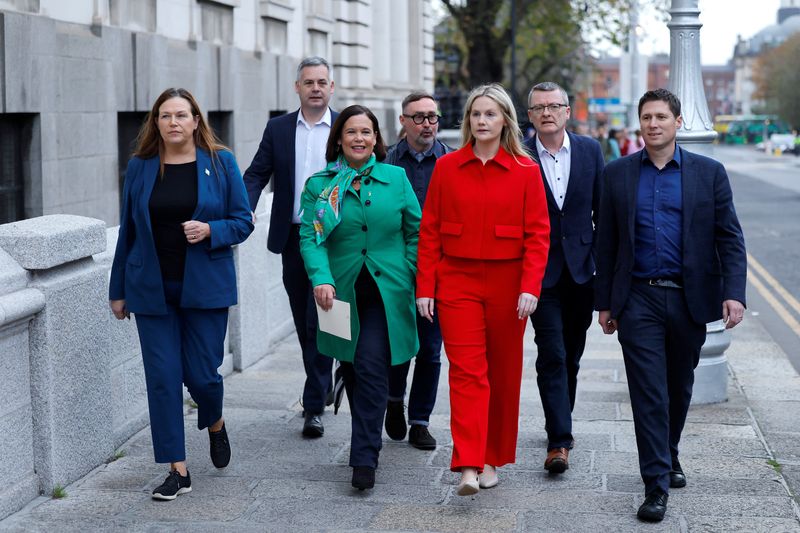By Padraic Halpin and Amanda Ferguson
DUBLIN/BELFAST (Reuters) – Sinn Fein’s polling collapse from government-in-waiting to likely also-rans at an Irish election next week looks set to rob Irish nationalists of a potentially transformative moment in their pursuit of a united Ireland.
Earlier this year the party appeared on the brink of power in Dublin for the first time, placing it in government on both sides of the Irish border and ramping up preparations as it sought to force London to hold a referendum on a united Ireland within a decade.
But a fracturing of the party’s electoral coalition – in large part due to anger among traditional working class voters at its relatively liberal attitude to immigration – appears to have closed the path to power at the Nov. 29 election.
That could shelve – for the foreseeable future – Sinn Fein’s plans for an Irish government minister for reunification, unity planning by both a parliamentary committee and a citizens’ assembly and a “diplomatic offensive” to promote the goal at the United Nations and across the EU.
“An Irish government led by Sinn Fein would change the dynamics of this quite dramatically … Sinn Fein are an absolutely vital part,” said Colin Harvey, a human rights law professor at Queen’s University, Belfast, and board member of Ireland’s Future, a group that promotes debate around unity.
“But I think it’s essential to underline that this won’t be taken forward by any one political party. It needs to be a wide, broad and deep political and civic coalition.”
In campaigning in Dublin, there were precious few signs of such a coalition being built south of the border.
On a two-hour Sinn Fein canvass in one of its working class Dublin strongholds of Donaghmede – part of a constituency where it scored the highest vote of any party nationwide in the 2020 election – Reuters did not hear unity raised on one doorstep.
Instead unaffordable housing costs and under-resourced state services dominated discussions.
“It (Irish unity) has in the past been something me and my friends and people my age have spoken about, I don’t think with everything else going on right now it’s number one priority,” said 30-year-old teacher Deirdre Ní Chloscaí, walking by Dublin’s main thoroughfare of O’Connell Street.
LOW PRIORITY
While a commitment to Irish unity is a historical touchstone of Sinn Fein’s main rivals in the Republic, they have left the subject as little more than a footnote in their election manifestos.
Prime Minister Simon Harris’ Fine Gael devoted less than a page to Northern Ireland in its 124-page plan and favours a continuation of the outgoing coalition’s much more gradual path to unity – in part by investing some of Ireland’s huge budget surplus in Northern Ireland, where finances are more strained.
Harris’ main coalition partner, Fianna Fail, has gone a touch further, promising to engage with other parties on how potential proposals concerning unity could be developed and pledging to invest another 1 billion euros in cross-border projects.
An opinion poll on Sunday put Fine Gael and Fianna Fail on a combined 43%, suggesting they could again reach a majority with a third, smaller party. Both have ruled out governing with the left-wing Sinn Fein, who were on 18%.
That is a sharp change from a year ago when Sinn Fein was on course to be by far the largest party at 35%, and either bypass their centre-right rivals or leave little choice but for one of them to act as a junior partner.
UNDERLYING TRENDS
Sinn Fein insists that the only poll that matters is that on election day – and that irrespective of the result, broad trends are set to deliver a united Ireland.
“We have committed to putting the reunification question at the very heart of government,” Sinn Fein leader Mary Lou McDonald told Reuters. “But this is the direction of travel quite irrespective of who is in government.”
Despite the relative lack of interest, a large majority of voters south of the border support the ending of British rule in Northern Ireland in polls.
While polls show a comfortable majority in Northern Ireland favour remaining in the UK, the gap has narrowed slightly since Britain’s departure from the European Union put unity higher on the agenda in a region where a clear majority voted to remain in the EU with the Republic of Ireland.
Other trends have also steadily moved the dial in favour of unity, from Sinn Fein becoming the first nationalist party to lead the regional power-sharing government, to 2021 census data showing Catholics – who are more likely to support unity – outnumbered Protestants for the first time.
Under the terms of the 1998 Good Friday peace agreement, the British government is obliged call a referendum if it appears likely that a majority would back a united Ireland.
“The scale of change has been so profound, especially north of the border, that the truth is the question is now live,” McDonald said.

































